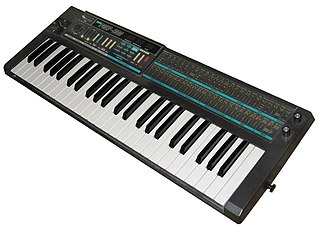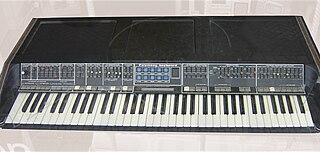
An electronic musical instrument is a musical instrument that produces sound using electronic circuitry. Such an instrument sounds by outputting an electrical, electronic or digital audio signal that ultimately is plugged into a power amplifier which drives a loudspeaker, creating the sound heard by the performer and listener.
A software synthesizer, also known as a softsynth, or software instrument is a computer program, or plug-in that generates digital audio, usually for music. Computer software that can create sounds or music is not new, but advances in processing speed now allow softsynths to accomplish the same tasks that previously required the dedicated hardware of a conventional synthesizer. Softsynths are usually cheaper and more portable than dedicated hardware, and easier to interface with other music software such as music sequencers.

Moog synthesizer may refer to any number of analog synthesizers designed by Robert Moog or manufactured by Moog Music, and is commonly used as a generic term for older-generation analog music synthesizers. The Moog company pioneered the commercial manufacture of modular voltage-controlled analog synthesizer systems in the mid 1960s. The technological development that led to the creation of the Moog synthesizer was the invention of the transistor, which enabled researchers like Moog to build electronic music systems that were considerably smaller, cheaper and far more reliable than earlier vacuum tube-based systems.

The Korg Poly-800 is a synthesizer released by Korg in 1983. Its initial list price of $795 made it the first fully programmable synthesizer that sold for less than $1000. It featured a 49 key non-velocity sensitive keyboard, two buttons for data entry, and a joystick controller, which could modulate the DCO pitch or the VCF. Though the Poly-800 had MIDI, it did not feature MIDI SysEx functionality, and patches had to be backed up to cassette tape. It had 8-voice polyphony (paraphony) with one DCO per voice. It could be switched into double mode which stacks two DCOs for a fuller sound, but reduces the polyphony to 4 voices. It featured one analog resonant low-pass VCF with 24 dB/oct which was shared for all voices. Like a monophonic synthesizer, the filter was switchable between single or multiple modes. In single mode, the first key pressed triggers the filter envelope, and unless all keys are released, the filter does not re-trigger. In multi mode, each key pressed in turn triggers the filter envelope, even if other keys are still pressed down. Further it had three digital envelope generators, a noise generator, an LFO, and a chorus effect. The Poly-800 could be run off batteries and had guitar strap pegs, allowing a performer to wear it like a guitar. It was also available with reversed-colored keys, which gave an appearance similar to a Vox Continental organ.

The ARP Odyssey is an analog synthesizer introduced in 1972. Responding to pressure from Moog Music to create a portable, affordable "performance" synthesizer, ARP Instruments, Inc. scaled down its ARP 2600 synthesizer and created the Odyssey, which became their best-selling synthesizer model.
Arturia is a French electronics company founded in 1999 and based in Grenoble, France. The company designs and manufactures electronic musical instruments, including software synthesizers, drum machines, analog synthesizers, MIDI controllers, sequencers, and mobile apps.

The Polymoog is a polyphonic analog synthesizer that was manufactured by Moog Music from 1975 to 1980. The Polymoog was based on divide-down oscillator technology similar to electronic organs and string synthesizers of the time.

The Moog model 2090 Micromoog is a monophonic analog synthesizer produced by Moog Music from 1975–79.
The Moog Source is a monophonic Z80 microprocessor-controlled analog synthesizer manufactured by Moog Music from 1981 to 1985. The Source was Moog's first synthesizer to offer patch memory storage. The design was also the first Moog synthesizer to feature a flat-panel membrane keyboard to replace the standard buttons, knobs and sliders, along with multihued panel graphics that were very different from anything Moog offered at the time. Sound wise it is considered to sound more like the original Moog Minimoog than any other synthesizer made by Moog and was introduced as its replacement.

A synthesizer or synthesiser is an electronic musical instrument that generates audio signals that may be converted to sound. Synthesizers may imitate traditional musical instruments such as piano, flute, vocals, or natural sounds such as ocean waves; or generate novel electronic timbres. They are often played with a musical keyboard, but they can be controlled via a variety of other devices, including music sequencers, instrument controllers, fingerboards, guitar synthesizers, wind controllers, and electronic drums. Synthesizers without built-in controllers are often called sound modules, and are controlled via USB, MIDI or CV/gate using a controller device, often a MIDI keyboard or other controller.

The Little Phatty is a monophonic analog synthesizer manufactured by Moog Music from 2006 to 2013, preceded by the Voyager and succeeded by Voyager Old School. Its design was conceived, in part, by Robert Moog himself, and is the last instrument to have that distinction, although the primary engineer was Cyril Lance. It is also the first Moog product to be produced following his death.

The Steiner-Parker Synthacon is a monophonic analog synthesizer that was built between 1975 and 1979 by Steiner-Parker, a Salt Lake City-based synthesizer manufacturer. It was introduced as a competitor to other analog synthesizers, like the Minimoog and ARP Odyssey.

The Arturia MiniBrute is a monophonic, pure analog synthesizer designed and manufactured by Arturia, a French synthesizer software and hardware company. Although the MiniBrute was the first piece of hardware created by Arturia—which had previously exclusively marketed software synthesizers—it generated strong sales.
The Grandmother is an analog semi modular, 32 key synthesizer released by Moog Music Inc. incorporating circuits based on the Moog modular synthesizer Model 15, and the Minimoog.















